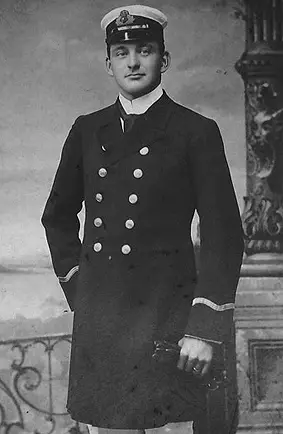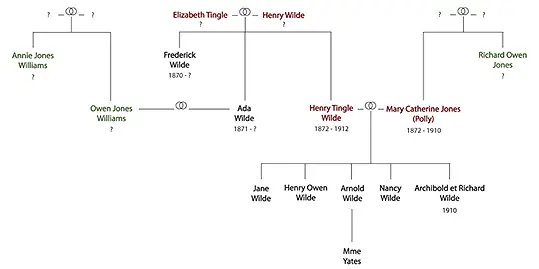Side Menu:
Chief Officer Wilde
Background
Henry Tingle Wilde was born in Walton, Liverpool on 21 September 1872. Christened at the Loxley Congregational Chapel in Bradfield, Yorkshire on 24 October 1872, he was the son of Henry Wilde, an insurance surveyor from Ecclesfield, South Yorkshire. His mother was Elizabeth Tingle of Loxley, Bradfield. He had two older siblings, Frederick born 1870 and Ada born in 1871.

An early photograph of Henry T Wilde,
courtesy of Chris Bayliss/Champ News
(Click image to enlarge)
Henry went to sea in his teens, beginning an apprenticeship with Messrs. James Chambers & Co., Liverpool on 3 October 1889, onboard the 1835-ton Greystoke Castle, which concluded four years later on 22 October 1893. From there, he served as third mate aboard the Greystoke Castle, and then moved on to third mate of the 1374-ton Hornsby Castle. His first steamship posting was aboard the S.S. Brunswick in 1895, where he served initially as third mate, then as second mate. In 1896, he transferred to the S.S. Europa and served aboard her as second mate. In July 1897, he joined the White Star Line. Starting as a junior officer, Wilde rose steadily through the ranks while serving on several White Star ships. These included the Covic, Cufic, Tauric, and Delphic. In August 1911, Wilde became Chief Officer of Titanic's sister, the RMS Olympic, where he served under Titanic's future captain, Edward J. Smith. He was chief officer of the Olympic at the time of the collision with the cruiser Hawke.
Wilde held an extra masters certificate and had attained the rank of Lieutenant in the Royal Naval Reserve.
Sidney H.V. Abbott, a shipmate of Murdoch and Wilde who wrote to Walter Lord when he was researching his book A Night to Remember in 1955, recalled the following about Wilde:
"Wilde joined the old Teutonic in April 1911 and only served one trip when he was transferred to the Olympic where he remained until he went to the Titanic. During the short period I served with him, three weeks only. I remember him as a splendidly built man, rather quiet, perhaps a stickler for etiquette, but giving the impression of a most efficient officer." (letter dated 25/6/55 courtesy of Paul Lee's transcription of Lord's, and Macquitty's, notes and letters, source)
Family Tragedy
On 24 December, 1910 tragedy struck when Wilde's wife Mary Catherine (also known as "Polly" born in 1872) and twin sons Archibold (Archie) and Richard died. His wife died on 24 December, 1910 likely from complications during childbirth. Their twin sons died in infancy shortly thereafter. Some sources indicate that they died from Scarlet Fever. According to Titanic author Inger Sheil "the twins didn't die quite at birth - they survived a few weeks, but perished of what was identified as a 'congenital disability' (I wonder if possibly they were premature)." (8.)

Wilde family tree, courtesy of Tiphaine Hirou (Click to enlarge)
Most sources list Wilde as having four surviving children: Jane, Harry, Arnold and Nancy and a sister Mrs Williams (née Wilde). (8.) According to the National Archives at the time of the 1911 census he was a widower living at 25 Grey Road, Walton, Liverpool. An article on Wilde mentions that "Henry was away at sea, but the census form was filled in by his housekeeper, Jane Martindale. It includes four surviving children, Jane Elizabeth, Henry Owen, George Arnold and Annie, and a general servant." (source)

Three of Henry Wilde's children,
Source: 20minutos.es
(Click image to enlarge)
As to what happened after the loss of their father, Inger Sheil writes in Encyclopedia Titanica:
"Mary Catherine Wilde's brother, Richard Owen Jones, was one executer and trustee named in Wilde's Will. The other was Owen Jones Williams, who was the husband of Wilde’s sister Ada. Owen’s sister, Annie Jones Williams, was appointed by the will to act as guardian of the children during their minority, in consultation with the trustees. Other than a bequest of £100 to Ada, the rest of the estate went effectively, in the legalese of the Will, to the ‘maintenance and advancement in life of my four children.’ Probate of the will was granted to the executers on the 12 July 1912 and his estate was valued at £6783.3.9d. My understanding is that the Williams family raised the children and made a home for them. Both sides of the family had a role in this, however, as stipulated in the Will." (8.)